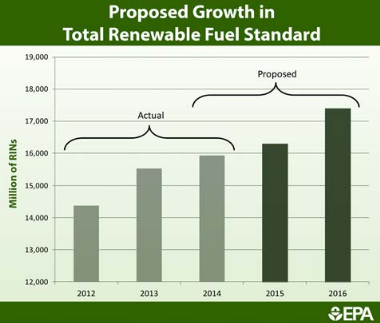The EPA hopes to make nearly 10% of all transportation fuels renewables by 2016
The Environmental Protection Agency’s (EPA) recently released its annual Renewable Fuel Standard (RFS) program with goals for renewable fuels that apply to all gasoline and diesel produced or imported in 2014, 2015 and 2016. The EPA decided to lower the goals from those set earlier by Congress to better reflect historical averages and realistically view potential future growth. In the RFS, the EPA covers standards for cellulosic biofuel, like ethanol, biomass-based diesel and advanced biofuels.
For 2014 total proposed RFS requirements are 15.93 billion gallons versus 18.15 billion gallons in the statutory requirement and the previously proposed 20.5 billion gallons. For 2015, total proposed RFS requirements are now 16.3 billion gallons versus 20.5 billion gallons in the statutory requirement. For 2016, the total proposed RFS requirements is now 17.4 billion gallons versus the 22.25 billion gallon statutory requirement. The EPA also proposed 1.90 billion gallons of biomass-based diesel for 2017.
The EPA’s proposed targets for renewable fuels were revised down from those set by Congress in the Clean Air Act, saying “due to constraints in the fuel market to accommodate increasing volumes of ethanol, along with limits on the availability of non-ethanol renewable fuels, the volume targets specified by Congress … cannot be achieved.”
There is a public hearing on June 25 in Kansas City on the proposal, and comment will remain open until July 27. The announcement came several days after the EPA’s deadline of June 1. The agency plans to propose/finalize targets for 2014 and 2015 by November 30, 2016. It also hopes to propose/finalize 2016 RFS by the same time, according to a note from Wells Fargo Equity Research.

